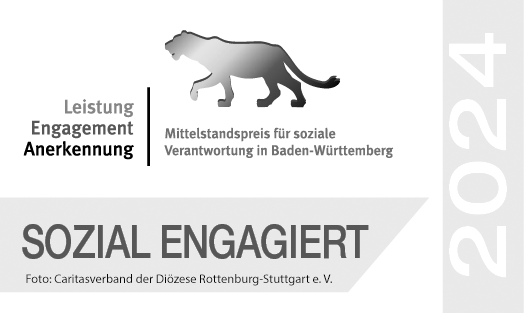Program Structure
You are here: Programs & Courses » Master's Programs » Mannheim Master in Sustainability & Impact Management (Part-Time/Blended) » Program Structure
Holistic and Impactful Learning
The holistic approach of the Mannheim Master in Sustainability and Impact Management guarantees that impact management will become an integral element of all operational areas of the company.
We have devised a program structure and course contents that will provide impactful learning.
Participants become proficient in essential management skills with a specific focus on challenges of the future like sustainable impact management in an increasingly digitalized environment. Insights into current best practices from various companies and industries as well as personal skills courses round off the program.
An Overview of the Program Structure
The Mannheim Master in Sustainability and Impact Management is organized in modules that build on each other over a period of 24 months. This allows you to retain full-time employment throughout the program and apply your newly acquired knowledge directly at your workplace. (Click to enlarge the chart)
Business Fundamentals
The Business Fundamentals segments are an integral part of the program. They will effectively guarantee that:
- all students at Mannheim Business School have basic business knowledge
- there is a stable foundation of academic findings for all Master’s programs
- all participants comprehend and develop a general understanding of the discipline.
They moreover provide basic knowledge for later more specialized courses.
Impact Management Project
Our Master Thesis is designed as a group project with a duration of 12 months. During our Impact Management Project you will have the opportunity to apply the expertise and tools you have gained during the program on a real-world sustainability topic together with the members of your interdisciplinary Multi-Competence Team. Usually, the project is a consulting project with a company.
Personal Skills
Essential program elements such as the Sustainability and Impact Management Project require that you work with classmates in heterogeneous teams, just as you would at your workplace. Personal skills courses (e.g. presentation skills, agile methods, etc.) foster the necessary key qualities you need for management positions.
Workshops
The program includes regular workshops where participants can take a deep dive into current topics and practical challenges. These events further provide room for networking and exchange of knowledge. Over and above individual learning, we aim to create a community that fosters peer learning.
The Course Contents in Detail
Make an impact. Please find a detailed description of exemplary courses of the Mannheimer Master in Sustainability and Impact Management below.

SUSTAINABLE BUSINESS
Sustainable Procurement
To become sustainable, companies need to make changes not only in their own operations, but also across their vast supply chains. Many sustainability issues are more pressing in the supply chain than in a company’s own operations; for example, the majority of greenhouse gas emissions occur in the upstream supply chain. However, unlike their own operations, companies cannot directly control the sustainability performance of their supply chain. In most organizations, it is the responsibility of Procurement to manage and improve the sustainability performance of the entire supply chain. The objective of this course is to understand the critical role that Procurement and the upstream supply chain play in enhancing the sustainability performance of the company, to outline levers to improve sustainability along the supply chain, and to critically reflect on the obstacles that Procurement and their organizations face in pulling these levers.
Learning Goals – In this course, participants...
- Study the foundations of Sustainable Procurement;
- Understand the challenges of integrating sustainability into daily actions;
- Engage in a critical outlook on the evolution of supply chain sustainability, with a particular focus on the role that regulations and stakeholder expectations play.
Sustainable Logistics & Supply Chain Management
Supply chain management is concerned with all activities aimed at satisfying customer demand. It is paramount to the creation of business value. The last decades have seen an increased environmental and social pressure on companies towards a more sustainability-conscious behavior. Therefore, sustainable supply chain management has become key to a company’s future success. However, due to the global, connected, and interdependent nature of today’s supply chains, the path towards more sustainability is challenging for many companies. This course will illustrate the various challenges and provide insights into concepts to support the transition towards sustainability in supply chain management.
Learning Goals – In this course, participants...
- will learn about the different sustainability dimensions and how they relate to supply chain management;
- will get to know major levers and concepts for transitioning towards more sustainable supply chain processes;
- will understand how digitalization can be an important enabler for sustainable supply chain management.
Sustainable Entrepreneurship
Over the recent year, the traditional distinction between for profit and non-profit organization has been shifted to allow for a new variety of organizations in between. Specifically, social entrepreneurs have increasingly set out to use market-based business models to solve social or environmental issues and make a positive impact. Further, social intrapreneurs are increasingly contributing to the sustainability transformation of large organizations with some companies even setting up structured programs to support them.
Learning Goals – In this course, participants...
- Gain an understanding of the concept and role of social entrepreneurship and intrapreneurship;
- Learn about the ways in which entrepreneurship can contribute to various sustainability domains;
- And critically discuss the political and institutional developments around varying forms of organizations.
Sustainability Communication
Sustainability communication can be a double-edged sword. On the one hand, stakeholders want to be informed about an organizations‘ impacts. On the other hand, talking too much about one‘s own sustainability achievements may lead to perceptions of greenwashing and trigger stakeholders‘ skepticism. Further, new communication pathways, e.g., via social media offer avenues for two way communication and dialogue which so far, remains underexplored by many organizations.
Learning Goals – In this course, participants...
- gain knowledge about the basic approaches to effective sustainability communication;
- reflect on potential threats of wrongly designed sustainability communications;
- and discuss current developments and trends with regard to sustainability communication methods.
Sustainable Finance
The European Action Plan for Financing Sustainable Growth, or Sustainable Finance Action Plan, focuses on the Environment, Social and Governance (ESG) fields of activity in order to achieve sustainability goals together with the financial sector.
This is also accompanied by binding legal requirements for companies. The EU taxonomy, for example, represents a uniform classification system for sustainable economic activities and investments for six defined environmental objectives.
Learning Goals – In this course, participants...
- acquire basic knowledge about foundations of sustainable finance;
- they learn to understand how ESG data can be applied to evaluate the sustainability of investments;
- and they critically discuss the current and prospective developments in financial markets.
Change Management & Organizational Dynamics
Making an organization more sustainable oftentimes means introducing change to the organization which may lead to resistance. Such change processes have to be carefully designed and managed to be effective and managers need to have a clear understanding of stakeholder attitudes and organizational dynamics.
Learning Goals – In this course, participants...
- learn the basic theoretical concepts with regard to organizational change management;
- engage in discussions about the potential implications of sustainability-related change on organizations and their employees;
- and gain insights into methods that can be applied to successfully manage such transformations while engaging the organizational members.
Innovation, Market Dynamics, and Consumer Demand
Markets are key drivers of sustainability and an increasing consumer demand for sustainable products has led to mainstream retailers including sustainable products into their portfolios. At the same time, in many industries, what consumers report in surveys with regards to their sustainability attitudes differs greatly from what they really do at the checkout (referred to as the consumer paradox). Companies for instance frequently complain about a lack of willingness-to-pay for sustainable products. Understanding market dynamics and consumer demand are thus urgently needed skills to steer towards sustainability.
Learning Goals – In this course, participants...
- gain an understanding of market dynamics and consumer demand for sustainable products and services;
- learn how companies can use market research methods to analyze these developments;
- and discuss how companies can activate consumers to engage in more sustainable consumption practices.
Sustainable Manufacturing & Service Operations Management
- tba
Impact Investing
We are facing immense challenges – all summarized in the SDGs. To address these issues, we need: Clear values, innovation and capital. Therefore, we the finance sector has to change to be an essential part towards the solutions.
The objects for this course are...
- To get an overview of sustainable finance and impact investing;
- To understand regulatory frameworks;
- To learn tools for impact measurement;
- To get concrete insights about investment approaches and vehicles.
SUSTAINABLE TECHNOLOGIES
Energy Technologies
The energy landscape has been undergoing a dramatic change over the past years and will continue to do so. The transition from a fossil-fuel based power generation towards a zero-carbon emission one will require massive investments into the energy infrastructure.
Renewable energy technologies like wind power and solar power will be the dominating power generation technologies – combined with energy storage technologies. We will see both large central power generation installations (e.g. large wind or solar farms), but also decentral power generation (e.g. roof-top solar) in combination with increased electrified local consumption (e.g. heat-pumps, e-cars), so-called distributed energy applications.
The course is designed to provide the students with the basic underlying concepts as well as with multiple examples on how companies take this into action incl. the implications on the overall so-called energy transition within countries/regions.
The course is designed to provide the students with a well-balanced mixture of conceptual work and multiple real-life experiences on how new energy technologies are being applied within a business and broader political/ecosystem context.
Learning Goals – In this course, participants...
- The basic principles of the concept of the energy-transition (“Energiewende”);
- The challenges and opportunities arising from that massive shift in the way electrical energy is being produced and distributed.;
- Extensive coverage of the three most important technologies in the context of renewable power generation: solar energy, wind energy and energy storage;
- Some high level coverage of adjacent/emerging energy technology topics like smart meters, hydrogen, e-fuels, ESCO business models;
- The application of the learnings in a group case study.
Water Technologies
Water technology is one key point of environmental engineering and therefore a key part of our future. Due to the environmental pollution, the climate change or our increasing world population, challenges in water related topics as water supply are increasing.
The main facets of water technology that we will explore with you are: water quality, water pollution, water and wastewater treatment as well as water as energy
We will talk about the issue of mitigating climate change in relation to issues like droughts and flood protection, but a also water reuse and resource recovery.
Next to industrial wastewater treatment and sea water desalination, we will also cover the topic of humanitarian engineering and will discuss topics as rainwater harvesting and resources-oriented sanitation. Within the seminar we will also discover the various aspects of water conflicts.
The objects for his course are...
- Being able to judge the water quality, to name the contained substances and their impact on the environment;
- Apply principles and techniques of water and wastewater treatment and select appropriate methods for treatment;
- Discuss aspects of various topics of water conflicts.
Climate Change & Decarbonization
The course is structured around climate change and decarbonization challenges and opportunities in a corporate context. This involves an introduction to climate change and carbon regulation. Furthermore, it involves corporate decarbonization efforts and a review of recent developments in practice with a focus on emerging climate technologies.
The objectives are threefold:
- Increase your understanding of the causes and consequences of climate change.
- Develop a holistic view of corporate decarbonization claims and pathways.
- Become familiar with major technological changes and cost-effective decarbonization solutions.
Waste, Circular Economy & Life Cycle Assessment (LCA)
Our society is currently using more resources than our planet can regenerate every year – keeping in mind that the resources we can utilize are not infinite, it is clear that we all cannot continue in the typical “make-use-waste” approach. Circular economy is supposed to be one of the major levers to transform both our society as well as the underlying businesses into a more resource efficient ecosystem.
The circular economy covers basically all kinds of resources, which can be raw materials, but also energy and water. The management of waste streams is an important element of the circular economy, but the circularity concept is much more comprehensive. The course is designed to provide the students with the basic underlying concepts as well as with multiple examples on how companies take this into action.
The course is designed to provide the students with a well-balanced mixture of conceptual work and multiple real-life experiences on how the circular economy is being applied within a business context.
Learning Goals – In this course, participants...
- The basic principles of a circular economy approach;
- The challenges and opportunities from a business context;
- Some relevant deep dives on relevant waste streams/material streams incl. economical models;
- The methodologies on how to measure the level of circularity in a business context (introduction to the “Circelligence” tool and approach);
- The application of the learnings in a group case study.
REGULATION, GOVERNANCE & REPORTING
Non-Financial Performance Evaluation & Reporting
Mitigating climate change and transforming the economy towards environmental sustainability are major challenges of the current as well as future generations. Companies are required to contribute to that transformation and are facing new reporting requirements on the sustainability of their business activities.
The course Non-Financial Performance Evaluation & Reporting introduces participants to the most recent and fundamental non-financial disclosure requirements in the European Union, i.e. the Corporate Sustainability Reporting Directive (CSRD) and the EU Taxonomy regulation.
Course participants will learn the fundamentals of the relevant legislative procedure in the European Union. The resulting disclosure obligations and the associated challenges for companies are presented. Practical problems are presented, and solution approaches developed with course participants.
In this course, participants learn the core non-financial reporting requirements that European companies are facing, challenges on businesses subject to these obligations and smart solution approaches.
Learning Goals – In this course, participants will...
- understand the relevant legislative procedures;
- learn about the reporting requirements that companies must meet;
- gain insights on the current landscape in Non-Financial Reporting in the EU;
- face practical problems of companies facing these obligations and develop solution approaches.
The course aims at preparing participants to meet state-of-the-art reporting requirements while taking business needs and future-proof implementation into account.
Economics of Regulations
The course provides an introduction into economic concepts of environmental regulations. Why can the regulation of certain economic activities be beneficial and necessary in a market economy? Which crucial role do institutions and property rights have in order to overcome the so-called “Tragedy of the Commons”? How can the efficacy and efficiency of regulatory interventions such as bans, standards, carbon markets, environmental taxes and disclosure regulations be assessed?
Learning Goals – In this course, participants...
- gain an understanding how markets can fail to provide efficient outcomes, justifying regulatory interventions;
- become familiar with key properties of the most important environmental regulatory instruments;
- learn about the costs and opportunities resulting from such interventions for companies.
Impact Measurement & Valuation
Following the „what can‘t be measured can‘t be managed“ logic, organizations have increasingly introduced scientific methods of impact measurement to make their sustainability-related impacts transparent and comparable. Some organizations have further started to assign monetary values to these impacts. This practice is referred to as valuation.
Learning Goals – In this course, participants...
- gain insights into the state of the art of method development for impact measurement and valuation;
- discuss how introducing these methods affects the organizational structures and processes;
- and engage in a critical discussion about benefits and potential difficulties of impact measurement and valuation.
Corporate Governance
Environment-Social-Governance – Governance is one of the three key pillars of sustainable business and the key to realizing positive impacts on people and planet. Various organizations have redesigned their governance to not only ensure responsible business practices, but also to incentivize and thereby shape the sustainability transformation.
Learning Goals – In this course, participants...
- learn the basic concepts of responsible corporate governance;
- discuss how corporate governance can support and enable an organization‘s sustainability transformation;
- and engage in a discussion about potential future developments in the area of responsible corporate governance.
Sustainable Taxation
In the management of sustainability, accounting plays a crucial role to enable decision makers to include sustainability impacts into their decision making. Many organizations are this redesigning their accounting systems to include sustainability-related information. Further, over the last years, the public awareness of tax evasion practices has continuously increased. While these practices may be legal, a strong social norm is emerging that views avoiding tax payments as socially irresponsible. Instead of making large donations, many argue, companies should start by paying their taxes.
Learning Goals – In this course, participants...
- learn the basic concepts and theories related to socially responsible accounting and taxation;
- discuss the role that accounting and taxation play in the area of social responsibility and sustainability;
- reflect on how the field of accounting and taxation may develop in the upcoming years given the increasing role of sustainability.
Law & Policy
Empirical data demonstrates that the climate is changing and that these changes could produce increasingly serious consequences in the near and further future. This course explores the legal framework in which climate change mitigation and adaptation actions occur while also touching upon the field of nature and biodiversity in policymaking. It hereby lays a focus on the policy tools available to and used by regulators on an international, European, federal, state and municipal level. We will briefly also discuss the instrument of strategic litigation against states and corporations as a tool to incentivize policy makers and corporations to take action.
Learning Goals – In this course, participants...
- get to know the regulatory means of climate action at the international, European, federal, state and municipal level,
- understand, how policy strategies on the different legislatory levels relate to one another, including how these relationships can create opportunities and obstacles to climate change action,
- learn about procedural aspects of rulemakings and opportunities for public involvement in policy and regulatory development, and
- attain an overview on the landscape of strategic litigation and its aims using the example of climate change litigation.
Global Justice, Ethics & Human Rights
- tba
BUSINESS FUNDAMENTALS
Strategic Management
The central aim of this course is to provide students with the knowledge and skills necessary to become good strategists – whether in a large corporation, a mid-sized company, or an entrepreneurial startup. This course combines theoretical concepts and frameworks with clear practical application. It makes participants familiar with all aspects of the business strategy process, starting with goal setting and ending with strategy implementation, focusing especially on strategy analysis.
Financial Information & Markets
A key function of (modern) corporations is to create (financial) value for shareholders as well as for stakeholders. Understanding this value-creation process requires to capture the flow of information related to this value generation process as well as of the (financial) logics behind it. This course speaks to both dimensions: to the informational flow regarding this value generation process (financial accounting/reporting) as well as to the underlying logics of the financial of the value-creation mechanism (corporate finance). While financial reporting serves mainly to inform outsiders about the financials of the firm, corporate finance uses this information among other sources to allow to decide on the financial of projects of the firm and value them. At the same time, it proves to value the firm as a whole.
Decisions on project investments are driven by financial considerations, as are assessments on other long-term business decisions (e.g. company acquisitions, capital allocation in companies). The interaction with modern capital markets, which play a central role in the valuation of many different goods and assets, takes on a decisive function. This is true not only with regard to the raising of capital, but also in the valuation of assets. In this context, the course aims to provide a first insight and overview into the fascinating world of modern (corporate) finance, but also into the functioning of capital markets, while stressing the role of financial reporting and regulation for the communication between the owners of the firm (the shareholders) and the firm’s management.
Marketing
Marketing Fundamentals is designed to introduce participants to key concepts, tools, and practice of marketing. Effective implementation of marketing concepts requires knowledge of key relationships between the 3 Cs - internal (company) and external (competitors and customers) environments. This course will especially address issues pertaining to marketing strategy, segmentation, targeting, and positioning and its implementation via specific marketing activities (i.e., product management with a focus on innovation, price management, brand and communication management).
Operations
Operations management is concerned with the design, planning, and control of the processes that create and deliver the firm’s products and services. As such, operations constitute one of the primary functions of a firm. Operations management must reconcile multiple conflicting objectives, notably cost and service. This course introduces concepts and methods that are useful in understanding the management of a firm’s operations. Important elements include capacity management, process design, and management of throughput times.
Business Analytics
The course Business Analytics aims to equip students with the necessary skills and knowledge to analyze and make data-driven decisions related to sustainability and environmental issues. Throughout the course, students will work on hands-on assignments to apply the concepts they learn to real-world sustainability challenges and will enhance their analytical skills.
Topics covered in this course include:
- Understanding the role of data analytics in addressing environmental challenges and achieving sustainable business practices;
- Statistical Analysis for Sustainability: Introduction to statistical methods used in analyzing environmental data. Topics include regression analysis and multivariate analysis;
- Twin Transformation and Sustainability: Understanding the concept of "digital twins" in the context of sustainability and how it can be used to simulate and optimize sustainable processes and systems;
- Case Studies in Sustainable Analytics: Analyzing real-world sustainability projects and initiatives to understand the practical application of analytics in promoting sustainability.
All information is subject to approval by the university committees. Therefore, changes to study design and content as well as admission requirements are still possible.
Contact Person


Downloads
- Sample Schedule Mannheim Master in Sustainability and Impact Management
- Brochure Mannheim Master in Sustainability and Impact Management
- Payment Information Mannheim Master in Sustainability and Impact Management
- Tax Tip Mannheim Master in Sustainability and Impact Management
- Application Form Mannheim Master in Sustainability and Impact Management
- Factsheet Mannheim Master in Sustainability and Impact Management






